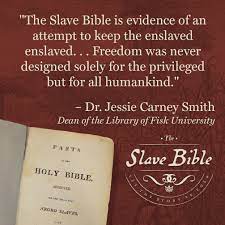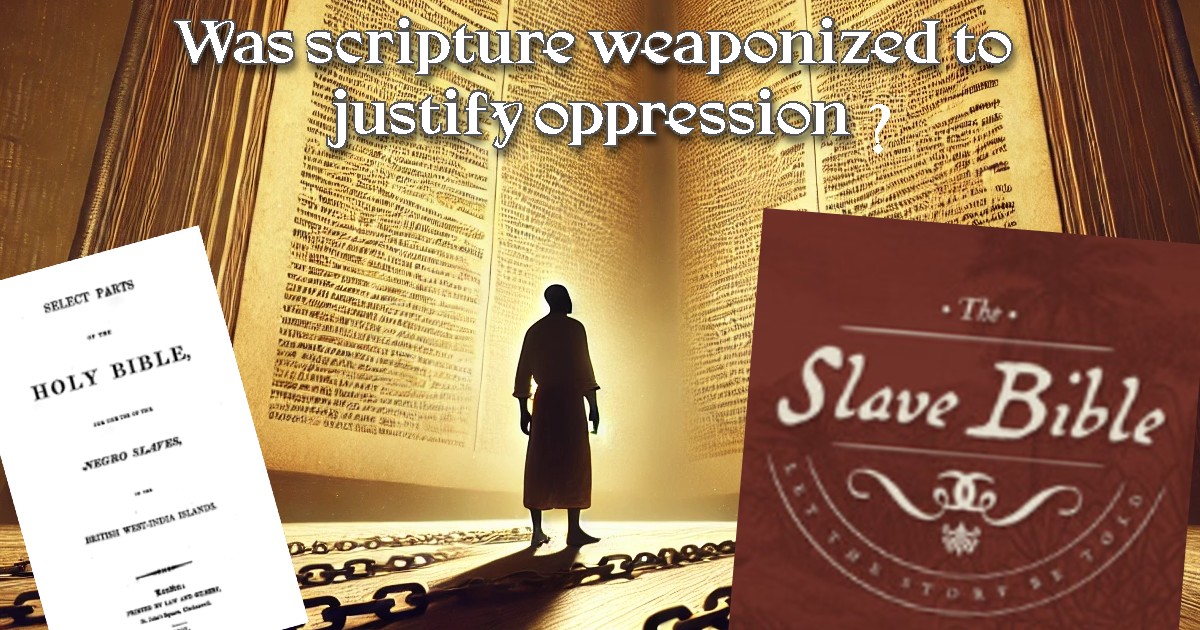Imagine a Bible where the story of Moses never happened. A Bible where the words “Let my people go” were erased. A Bible that deliberately omitted God’s promises of justice and freedom.
This isn’t a hypothetical. It was real. It was called the Slave Bible.
A Bible Designed to Keep People in Chains

Published in 1807 by British missionaries, the Slave Bible was an edited version of Scripture used to teach enslaved Africans in the Caribbean. But this was no ordinary Bible—it was a tool of control. Roughly 90% of the Old Testament and 50% of the New Testament were removed, leaving behind a carefully curated version of God’s word that encouraged obedience and submission while silencing any message of liberation.
Passages like Exodus 1–20, where God delivers the Israelites from slavery in Egypt? Gone.
Verses like Galatians 3:28—“There is neither Jew nor Greek, slave nor free… for you are all one in Christ Jesus.”? Completely removed.
What remained? Verses like:
- Ephesians 6:5 – “Slaves, obey your earthly masters with respect and fear.”
- Colossians 3:22 – “Slaves, obey your masters in everything.”
This wasn’t a mistake. It was intentional.
the Bible Was Used in the South to Justify Slavery
Throughout history, people have turned to religious texts to support their beliefs and social structures, and the institution of slavery in the American South was no exception. Southern theologians, politicians, and slaveholders frequently used the Bible to justify and defend slavery, arguing that it was divinely sanctioned and morally acceptable. By selectively interpreting scripture, they reinforced a system that dehumanized millions of African Americans while simultaneously positioning themselves as righteous adherents to God’s will.
Biblical Justifications for Slavery
Old Testament References
The Old Testament contains multiple references to slavery, which pro-slavery advocates in the South cited as evidence that the practice was an accepted and even God-ordained institution.
- Genesis 9:25-27 – The so-called “Curse of Ham” was one of the most widely used biblical justifications for racial slavery. Southern theologians argued that Noah’s curse on his son Ham’s descendants condemned them to servitude, and they falsely linked Africans to this lineage.
- Leviticus 25:44-46 – This passage explicitly allows Israelites to own slaves from surrounding nations. Slaveholders used it to argue that slavery was a legitimate and ancient institution endorsed by God.
New Testament Support
Pro-slavery advocates also turned to the New Testament, claiming that it reinforced the legitimacy of slavery and encouraged enslaved people to remain submissive.
- Ephesians 6:5 – “Slaves, obey your earthly masters with fear and trembling, with a sincere heart, as you would Christ.” This verse, along with Colossians 3:22 and 1 Peter 2:18, was interpreted as divine instruction for slaves to accept their status.
- 1 Timothy 6:1-2 – This passage advises slaves to respect their masters, further supporting the argument that slavery was not condemned in Christian doctrine.
- The Book of Philemon – The story of the escaped slave Onesimus, whom the Apostle Paul sends back to his master Philemon, was cited as evidence that the Bible condoned returning fugitive slaves rather than granting them freedom.
Theological and Social Arguments
Slavery as Part of the Divine Order
Many Southern Christians believed that slavery was part of God’s natural hierarchy, similar to the relationship between kings and subjects, husbands and wives, or parents and children. This argument suggested that slavery was not only acceptable but necessary for maintaining social order.
The “Civilizing” Mission
Another common argument was that slavery benefited enslaved people by exposing them to Christianity and European civilization. Slaveholders claimed they were fulfilling the Great Commission (Matthew 28:19-20) by introducing African slaves to the gospel, portraying themselves as benevolent caretakers rather than oppressors.
Religious Opposition to Slavery
While many Southern Christians defended slavery using the Bible, others—particularly abolitionists—argued that scripture, when interpreted holistically, condemned the practice.
- Exodus 21:16 – “Whoever steals a man and sells him, and anyone found in possession of him, shall be put to death.” This verse directly opposed the transatlantic slave trade.
- Galatians 3:28 – “There is neither Jew nor Greek, slave nor free, male nor female, for you are all one in Christ Jesus.” Abolitionists used this verse to argue for the spiritual and moral equality of all people.
Despite these counterarguments, the pro-slavery biblical interpretations helped sustain the Southern social order and justified harsh treatment of enslaved individuals. These theological justifications also contributed to splits within Christian denominations, leading to the formation of groups like the Southern Baptist Convention in 1845, which explicitly supported slavery at the time.
Legacy of Biblical Justifications for Slavery
Even after the abolition of slavery, interpretations of the Bible that supported racial hierarchy persisted, influencing segregation, Jim Crow laws, and other forms of institutional racism in the United States. The use of scripture to justify oppression serves as a cautionary example of how religious texts can be manipulated to serve social and political agendas.
References:
Blight, David W. Race and Reunion: The Civil War in American Memory. Harvard University Press, 2001.
Noll, Mark A. The Civil War as a Theological Crisis. University of North Carolina Press, 2006.
Raboteau, Albert J. Slave Religion: The “Invisible Institution” in the Antebellum South. Oxford University Press, 1978.
Genovese, Eugene D. Roll, Jordan, Roll: The World the Slaves Made. Vintage Books, 1976.
Tisby, Jemar. The Color of Compromise: The Truth about the American Church’s Complicity in Racism. Zondervan, 2019.
History.com: An article discussing how Bibles given to slaves omitted most of the Old Testament.
NPR: A piece on the Slave Bible from the 1800s that omitted key passages that could incite rebellion.
Smithsonian Magazine: An article on the heavily abridged Slave Bible that removed passages that might encourage uprisings.

